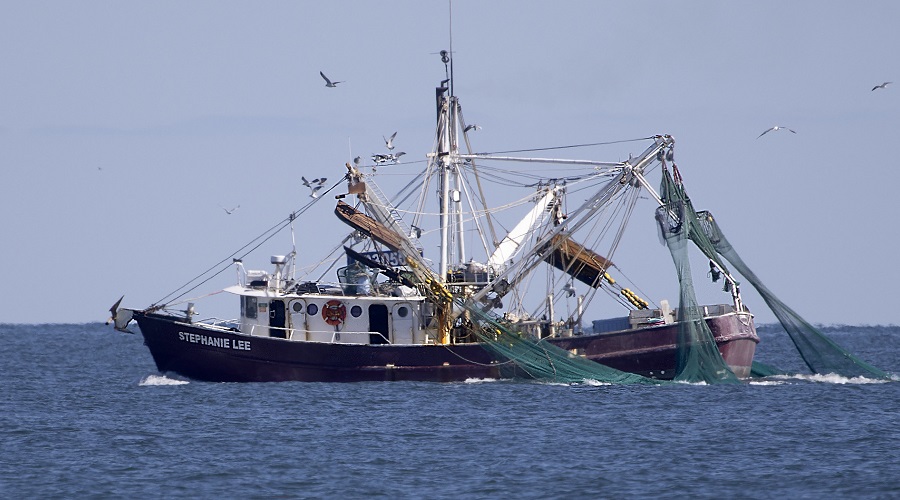
Shrimp trawler. Photo by Stephanie Lee, Flickr.
Fisheries scientists and marine biologists working in all corners of the world, from Canada to Australia, from Malaysia to Nigeria, and from Brazil to Monaco, are once again making a call to the World Trade Organization (WTO) to approve additional regulations that eliminate harmful fisheries subsidies.
In a commentary published in the journal npj Ocean Sustainability and an article published in The Conversation Australia, over 30 renowned researchers remind the WTO that well-managed wild fisheries are pillars supporting food and nutrition security, livelihoods, equity, and cultural heritage, particularly in the Global South, and call on the intergovernmental body to conclude fisheries subsidies agreement negotiations and craft the supplementary regulations essential for lasting sustainability and equity in the ocean.
Leading the push is top fisheries economist Dr. Rashid Sumaila, head of the University of British Columbia’s Fisheries Economics Research Unit and member of the Sea Around Us Advisory Board.
Other researchers associated with the Sea Around Us are also part of the effort, among them:
- Daniel Pauly, principal investigator of the Sea Around Us initiative at the University of British Columbia
- Dirk Zeller, director of the Sea Around Us – Indian Ocean initiative at the University of Western Australia
- Jessica Meeuwig, Wen Family Chair in Conservation and director of the Marine Futures Lab at the University of Western Australia and chair of the Sea Around Us Advisory Board
- Maria ‘Deng’ Palomares, project manager of the Sea Around Us initiative at the University of British Columbia
- Vania Andreoli, PhD candidate at the Sea Around Us – Indian Ocean initiative at the University of Western Australia
- Jennifer Jacquet, professor at the University of Miami and member of the Sea Around Us Advisory Board
- William Cheung, director of the Institute for the Oceans and Fisheries at the University of British Columbia and member of the Sea Around Us Advisory Board
Harmful subsidies are direct or indirect financial transfers from public entities to fishing companies. They include fuel subsidies, non-fuel tax exemptions, access deals that allow one country to fish in the waters of another, boat construction, renewal and modernization support, and the provision of market and storage infrastructure, among others. These harmful subsidies enable fishing capacity to increase to a point where the exploitation of fish stocks exceeds the highest catch they can support long-term, effectively resulting in overfishing.
Over $22 billion in harmful subsidies were given to global fisheries in 2018 with ten nations, among them China, Japan, Korea, the European Union and the United States, being responsible for 70% of this unsustainable financing. A recent Sea Around Us – Indian Ocean study showed that of that sum, $2 billion corresponded to harmful subsidies spent in the Indian Ocean region.
Most of these subsidies go to high seas and distant water fishing operations that typically access the resources of less-developed nations and which – evidence has shown – would be unprofitable without government subsidies.
In 2022, the WTO achieved a significant milestone by adopting a fisheries subsidies agreement aligning with strong recommendations from the global scientific community. Once ratified by two-thirds of WTO members, this agreement will partially address the United Nations Sustainable Development Goal Target 14.6 to eliminate harmful subsidies.
“Unfortunately, while this agreement is historic, it is narrow. It only prohibits member governments from financing illegal fishing activities and the exploitation of already overfished stocks. But it’s obvious illegal fishing should be banned and the focus on overfished stocks is too little, too late,” Vania Andreoli, Dirk Zeller and Jessica Meeuwig wrote in The Conversation article.
Echoing the comment in Ocean Sustainability, the researchers call on World Trade Organization member countries to take more decisive action to eliminate harmful subsidies at the 13th Ministerial Conference (MC13) that will take place from February 26 to 29, 2024 in Abu Dhabi, United Arab Emirates.
“Harmful fisheries subsidies are not only unsustainable but profoundly unfair. Based on the extensive body of evidence, the WTO should agree to eliminate harmful subsidies once and for all,” Andreoli, Zeller and Meeuwig wrote.

